Tehran Refuses To Comment As Chinese Ports Ban Iranian Shipping
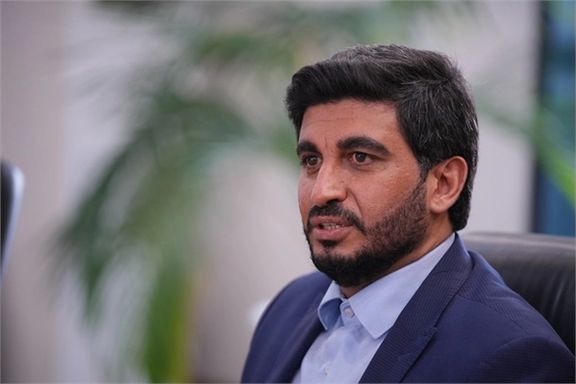
Tehran has refused to comment on the embarrassing revelation that China’s private ports are complying with a ban on Iranian shipping.

Tehran has refused to comment on the embarrassing revelation that China’s private ports are complying with a ban on Iranian shipping.
Ali Nazi, Deputy Director of Ports and Maritime Organization told ILNA news agency on Saturday that such “information is confidential.”
China has handed over most main ports to the private sector and foreign companies.
These operators do not allow Iranian ships to dock, for fear of being subject to US sanctions.
Iranian shipping can dock in Chinese government-controlled ports, but their inadequate facilities and equipment increase the loading and unloading time, while their locations increase voyage time and lead to higher costs.
China is a diplomatic ally of the Islamic Republic but so far it has avoided openly challenging US sanctions. While Beijing clandestinely imports hundreds of thousands of barrels of crude a day via third party channels, Iran gains little from the trade as intermediaries take most of the profits and often deliver goods instead of cash.
Official figures released by China's Customs show no direct oil purchase from Iran in 2021. But in March Bloomberg claimed that details from third-party sources indicated that Iranian oil was often re-branded as purchases from other countries and such exports had even surged.
The news about China’s compliance with US sanctions will be embarrassing for hardline supporters of Supreme Leader Ali Khamenei who have been trumpeting Iran’s “Looking East” policy.
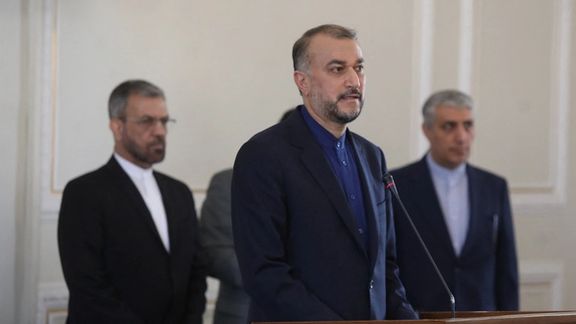
Tehran’s foreign minister has welcomed the warming relations between Iran and Saudi Arabia following their unexpected deal in March to resume relations.
Foreign minister Hossein Amir-Abdollahian expressed satisfaction over the introduction of ambassadors in a phone call on Friday reported by Iranian local media.
The joint agreement between predominantly Shia Iran and Sunni Saudi Arabia brokered by Beijing sent shock waves through the region when it was revealed earlier this year after long-standing rivalry between the two states.
"The Islamic Republic has taken the necessary measures for the official opening of its embassy in Saudi Arabia," said Amir-Abdollahian.
Iran's foreign minister added that "the plans to visit the respective capitals by the foreign ministers is a sign of determination of the parties to cooperate and renew relations."
Iranian media reported that the Saudi Foreign Minister bin Farhan expressed satisfaction over the developments in line with the Beijing agreement.
In the agreement to restore relations between Tehran and Riyadh, which was inked in March with the mediation of China in Beijing after eight years of tensions between the two archrivals, it was stated that the embassies and consulates will be reopened within two months.
Upon the visit of Iran's Minister of Economy to Saudi Arabia, Riyadh on Friday introduced its new ambassador to Tehran.
Iran's Economy Minister Ehsan Khandouzi led an economic delegation to Jeddah on Thursday to hold bilateral meetings with Saudi officials and talks with the Islamic Development Bank during his stay.
He met with his Saudi counterpart, Mohammed Al-Jadaan on the sidelines of the meeting of the Islamic Development Bank.

The Group of Seven (G7) Finance Ministers and Central Banks' Governors warned about the risks posed by Iran in illicit financial activities.
The officials held a meeting in the Japanese city of Niigata on Saturday and issued a statement on pressing global economic and security issues.
"We are deeply concerned with illicit financing risk emanating from Iran," the Group stressed in their joint statement and pledged full support for the international watchdog, the Financial Action Task Force, FATF for monitoring global compliance.
FATF is a Paris-based inter-state organization following the observance of international financial rules against money laundering and financing of terrorism.
Iran and North Korea are both on FATF ‘blacklist’ for not adhering to several international financial conventions. The designation virtually cuts off the violators from the international banking system.
Iran has failed to pass legislation to comply with FATF demands and is recognized as a high-risk country for financial transactions and investments.
The Iranian regime wants to have a free hand in financing militant groups around the world, which would violate FATF’s anti-terror financing rules.
The Iranian banking system controlled by the government is opaque and mired in debt and corruption.
Even if the United States lifts its economic sanctions, Iran would still be considered a high-risk country if it does not comply with international financial rules.
The G7 officials meeting in Japan also strongly warned about North Korea and its “illicit activities” related to “Proliferation of weapons of mass destruction.”

Hossein Ta'eb, a senior adviser to the IRGC says former President "Hassan Rouhani will be tried if not today, maybe another day for his decision's during his presidency."
However, while according to Etemad Online Ta'eb insisted that Rouhani should be tried, he commented that his trial is not the establishment's immediate priority.
Several social media users commenting on the report said that Ta'eb himself should be tried for security breaches during his tenure as the head of IRGC's Intelligence Organization. He was removed from his post last year after a series of serious sabotage acts in Iran attributed to Israel and a major case of infiltration by Israel was revealed. A top security official, Alireza Akbari was subsequently hanged on charges of espionage for foreign countries.
This was not the first time Iran's hardliners call for Rouhani's trial or accuse him of pursuing accommodation with the West and for concluding a nuclear agreement in 2015.
Rouhani recently said that he would file a complaint against a hardliner member of the Supreme Council of Cultural Revolution who has accused him and his aides of espionage.
Attacks on Rouhani by hardliners escalated when he was quoted last week as having said that an agreement with the United States was at hand before he handed over the presidency to Ebrahim Raisi in 2021.
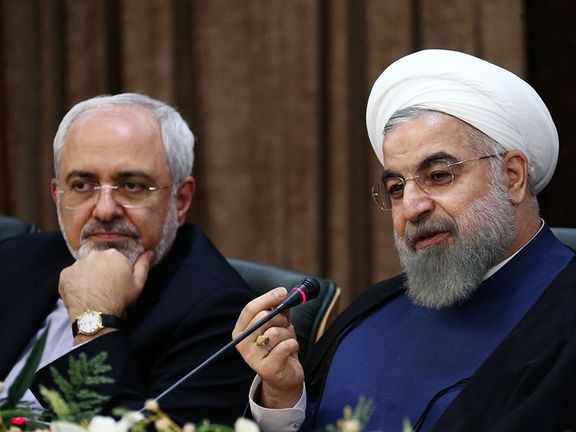
Rouhani who kept a low profile for 18 months after his presidency, began making public statements critical of the current economic and political situation in Iran and convening frequent meetings with his former aides. According to Entekhab website, which is close to Rouhani, on Friday, he said sarcastically that everyone expected Iran's problems to be solved now that a consolidated conservative government was in office.
Earlier attacks in April targeted Rouhani for suggesting a referendum on the country's key issues. Not only the hardliners in the government, but Supreme Leader Ali Khamenei lashed out at critics for the suggestion they said would undermine the regime's authority. Khamenei even went out of his way to say that the people are not knowledgeable enough to take part in referenda.
Rouhani has also criticized the current government for high inflation surpassing 50 percent and increasing poverty. He also criticized the government for barring reformist and moderate candidates from running in elections.
Some of Rouhani's allies like the former chief of the parliament's Foreign Policy and National Security Committee, Heshmatollah Falahatpisheh, say that he should have fought harder to revive the 2015 nuclear deal, the JCPOA. He said this week that détente and solving the nuclear dispute were among Rouhani's promises to the nation and he should have done more to that end.
"At least Rouhani and his aides should have explained to the nation about why the negotiations with the United States and Europe were not fruitful," Falahatpisheh added.
Meanwhile, foreign policy analyst Mehdi Motaharnia said in an interview with Rouydad24 website that what is transpiring between Rouhani and the hardliners is part of a crisis of decision-making in Iran. Motaharnia further opined that consolidating political power in Iran by handing over the whole establishment to conservatives was the regime's biggest strategic mistake.
The decision to engineer the elections and allow hardliners to form an absolute majority in parliament and win the presidency in 2020-2021, could have only come from Khamenei.
He said that the new government made "revolutionary rhetoric" the driving force of its foreign policy and brought the country face to face with a serious challenge it cannot resolve.
Referring to the tensions between Iran and the international community, Motaharnia stressed that the year 2023 is the year in which the Iranian government needs to take big and hard decisions to ensure the regime's stability.
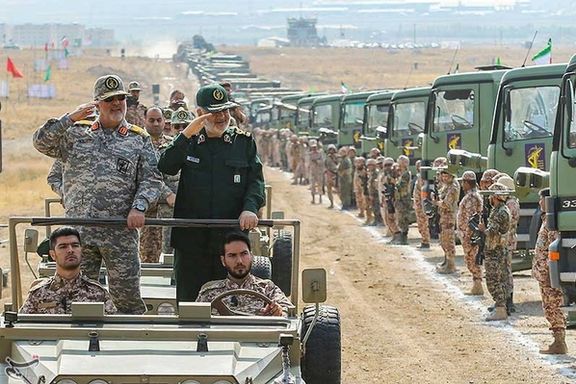
A bipartisan group of US congresspeople have urged Washington’s allies to designate Iran’s Revolutionary Guards as a terror group.
In letters addressed to the heads of the US-allied nations - the UK, Australia, Canada, and India - 22 Republican and Democratic lawmakers reiterated calls to swiftly act and officially join Washington in labeling the IRGC in its entirety.
“The Islamic Republic of Iran is the world’s leading state sponsor of terrorism and the IRGC is the central core of the country’s terrorist operations at home and abroad,” the lawmakers wrote Thursday, adding that “the IRGC has openly carried out plots targeting citizens around the world for decades.”
Rep. Claudia Tenney (R-NY) and Rep. Brad Schneider (D-Ill) led the effort in cooperation with Joe Wilson (R-SC), Brad Sherman (D-Calif), Pat Fallon (R-Texas), Adam Schiff (D-Calif) and 16 others.
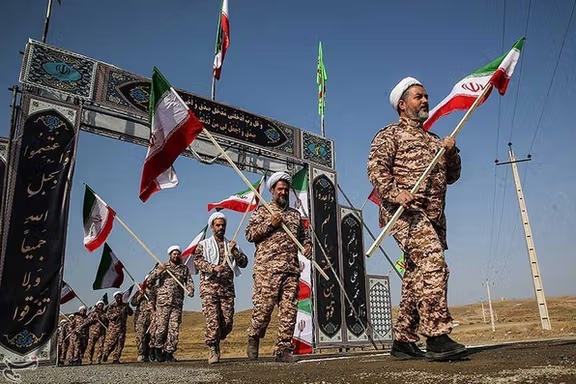
They argued that designating the IRGC will send a clear message to Iran that acts of terrorism against the US and its partners as well as innocent citizens “must not and will not be tolerated.”
“Now the United States Congress is calling on the United Kingdom, Australia, India, and Canada to join our fight in combating this organization’s cruelty,” Tenney said in a statement. “It is time that all nations designate the IRGC as a terrorist organization to send an unequivocal message that its terrorist activities must end.”
In each letter, the signatories elaborated on individual events that proved the IRGC is acting against the citizens of the four countries.
Canada has designated the Quds Force, the extraterritorial arm of the IRGC, but has been reluctant to list the IRGC as a foreign terrorist group. Canadian officials said last year that the designation would be too much of a “blunt instrument” that could punish innocent people in Canada who were conscripted into the IRGC as part of their mandatory military service.
The Australian Senate recommended the designation in February, but Canberra has suggested it may not legally be able to designate the IRGC as a terror group.
The UK has yet to make a formal decision, but it has been vacillating between the idea of proscribing the IRGC in its entirety and sanctioning only the senior members of the force for at least several months, especially after September when nationwide anti-regime protests engulfed the country. The IRGC, along with its paramilitary Basij volunteers, has been the main force to crack down on the popular uprising.
India is a close ally of the US, but it has long maintained cordial relations with Iran, and it is not expected to follow suit and blacklist the outfit.
The US is also ramping up its pressure on the European Union for the designation. In March, a bipartisan group of US senators wrote a letter to the High Representative for Foreign Affairs and Security Policy, Josep Borrell, encouraging the EU to designate the Islamic Revolutionary Guard Corps as a foreign terrorist organization.
Earlier in the week, the Swedish parliament unanimously voted to designate the IRGC. It swiftly followed the execution of Swedish-Iranian Habib Chaab (Asyud) which saw Sweden's Ministry of Foreign Affairs summon Iran's chargé d'affaires in protest of the execution, one of hundreds since the start of the year.
Earlier in the day, an Iranian lawmaker said Britain and France do not dare to designate the IRGC as a terrorist group because they know their forces in the region will be attacked if they do so.
Washington designated the IRGC as a foreign terrorist group in 2019 under the Trump administration as relations with Iran plummeted following Washington’s withdrawal from the 2015 nuclear deal. Tehran responded at the time by designating the US military as a terrorist group.
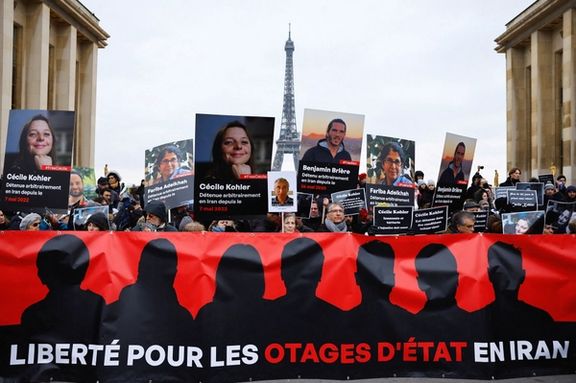
Two French citizens detained in Iran on spurious spying charges have been released and are on their way back to France.
President Emmanuel Macron announced the news on Friday that Bernard Phelan and Benjamin Brière were free, the two men among unknown numbers of diplomatic hostages held by the regime. "We will continue to work towards the return of those of our fellow nationals who are still detained in Iran," Macron said in a tweet.
French Foreign Minister Catherine Colonna spoke to her Iranian counterpart Hossein Amir Abdollahian, a few hours earlier.
Ties between France and Iran have deteriorated in recent months. Tehran had detained seven French nationals in what Paris described as arbitrary arrests equivalent to state hostage-taking.
The statements were released a day after the twitter account of Iran’s embassy in Dublin announced the release of Franco-Irish citizen Bernard Phelan who was earlier sentenced to 6.5 years in prison for "providing information to another country."
Benjamin Brière was sentenced to eight years in prison on spying charges. He had been held in Iran since May 2020, when he was arrested after flying a remote-controlled mini helicopter used to obtain aerial or motion images near the Turkmenistan-Iran border.
Philippe Valent, his France-based lawyer, called the espionage charges against his client a "fiction" and his trial "a parody staged by the Revolutionary Guard".
In the past decade, Iran's Revolutionary Guard have arrested dozens of dual nationals and foreigners, mostly on unproven allegations of espionage and breach of security, in what human rights organizations have said is essentially hostage taking.
Iran has been accused of wrongfully detaining at least a dozen foreign and dual nationals on trumped up charges, effectively as hostages to extract concessions from Western governments. However the full extent of these prisoners is unknown.